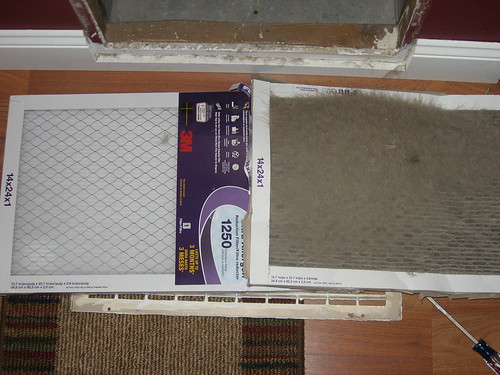Have you changed your home’s HVAC air filter lately? The air filter will typically be the first thing that an HVAC technician checks when they come to your home for a tuneup or repair. A dirty air filter is one of the most common reasons for an HVAC system to perform poorly, and many people forget to check them.
For maximum performance, the air filter needs to be changed every one to two months, and more often if you have pets or someone in the household with allergies. Before you do, however, you need to understand air filters and how to choose the right one for your home.
Air Filter Basics

An air filter for your HVAC system usually contains a material made of spun fiberglass, paper, or cloth in a thin cardboard frame. It’s a necessary component of your air conditioner, furnace, or heat pump system because it traps contaminants in the air that affect your indoor air quality and damage your expensive HVAC equipment. It catches household dust, pollen, mold spores, animal hair and dander, and bacteria as the air enters the system, so clean air can be redistributed into your house.
Air Filter MERV Ratings
The Minimum Efficiency Reporting Value, or MERV, is a measure of how well an air filter traps particles that are floating in the air. As you might expect, the higher the MERV rating, the more a filter costs — but that doesn’t mean you should purchase the cheapest. Here’s what to expect for each rating level:
MERV 1 to 4 — Basic, inexpensive filters that catch dust, fur, and pollen.
MERV 5 to 8 — Good filtration for most homes that catches mold spores, dust mites, and some household chemicals.
MERV 9 to 12 — High-quality filters that capture tiny particles such as fine dust, exhaust fumes, and some bacteria.
MERV 13 to 16 — The best filters available, they remove microscopic particles such as smoke, all bacteria, and some viruses.
Before making your selection, you need to find out what MERV rating your HVAC system is intended to use. Higher ratings are not necessarily better for your system, because a high-rated filter is denser and your system must work harder to push the air through. Restricting airflow reduces your system’s efficiency and can even damage it.
Disposable vs. Reusable Filters
Since HVAC air filters need to be replaced frequently, a homeowner who is frugal or eco-conscious may dislike buying and throwing them away month after month. Reusable air filters are available to solve this problem. However, reusable filters have their downsides as well. For one thing, they usually have MERV ratings of 1 to 4. So, if you prefer a filter with a higher rating and performance, disposable filters are the way to go. Also, reusable filters are much more expensive than disposable, though they are meant to last several years.
Reusable air filters also require more work for the homeowner, as they need to be cleaned monthly. To do this, remove the filter, hose it off to remove the dust and dirt, and let it dry. Many homeowners invest in at least two reusable filters so they can be alternated.










